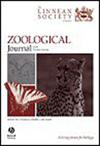Revision of the genus Robbea (Stilbonematinae: Desmodoridae), worldwide abundant marine nematodes with chromophoric Fe–Br inclusions and the description of a new stilbonematine genus
IF 3
2区 生物学
Q1 ZOOLOGY
引用次数: 0
Abstract
Nematodes are one of the most widespread and abundant animal taxa across aquatic and terrestrial environments. In marine shallow-water, porous sediments, members of the subfamily Stilbonematinae may be found in high numbers. Stilbonematinae are characterized by their coat of symbiotic bacteria, which give the nematodes a white appearance, while the nematodes themselves are usually colourless. We identified several species of the genus Robbea (Desmodoridae: Stilbonematinae) in which live specimens had a conspicuous dark purple coloration of the glandular sense organs (GSOs), highly specialized epidermal glands that are prominent in the Stilbonematinae. The dark inclusions in the GSOs of Robbea contained high concentrations of iron and bromide, regardless of their habitat. Morphological and phylogenetic analyses show that the genus Robbea is paraphyletic and we define the new genus Cyathorobbea gen. nov. for species with sucker-shaped post-pharyngeal supplements in males. Furthermore, we describe five new Robbea species from around the world. Some Robbea species are morphologically very similar and required the use of principal component analysis of morphometric data to untangle the diversity in this taxon. Our work emphasizes the value of live animal observations that enable the identification of important characters and highlights the overlooked diversity within the Stilbonematinae.修订 Robbea 属(Stilbonematinae: Desmodoridae)--世界范围内大量海洋线虫,具有发色性 Fe-Br 内含物,并描述一个新的 stilbonematine 属
线虫是水生和陆生环境中分布最广、数量最多的动物分类群之一。在海洋浅水多孔沉积物中,可能会发现大量 Stilbonematinae 亚科的成员。Stilbonematinae 的特点是其共生细菌的外衣使线虫呈现白色,而线虫本身通常是无色的。我们确定了 Robbea 属(Desmodoridae:Stilbonematinae)的几个物种,其中活体标本的腺体感觉器官(GSOs)呈明显的深紫色,这种高度特化的表皮腺体在 Stilbonematinae 中非常突出。无论其栖息地如何,Robbea 的腺感器中的深色内含物都含有高浓度的铁和溴化物。形态学和系统发生学分析表明,罗布泊属是一个副系,我们为雄性咽后有吸盘状补充物的物种定义了新属 Cyathorobbea gen.nov.。此外,我们还描述了来自世界各地的五个 Robbea 新种。一些罗布泊属物种在形态上非常相似,需要使用形态计量数据的主成分分析来解开该分类群的多样性。我们的工作强调了对活体动物进行观察的价值,这有助于鉴定重要的特征,并突出了被忽视的 Stilbonematinae 中的多样性。
本文章由计算机程序翻译,如有差异,请以英文原文为准。
求助全文
约1分钟内获得全文
求助全文
来源期刊
CiteScore
6.50
自引率
10.70%
发文量
116
审稿时长
6-12 weeks
期刊介绍:
The Zoological Journal of the Linnean Society publishes papers on systematic and evolutionary zoology and comparative, functional and other studies where relevant to these areas. Studies of extinct as well as living animals are included. Reviews are also published; these may be invited by the Editorial Board, but uninvited reviews may also be considered. The Zoological Journal also has a wide circulation amongst zoologists and although narrowly specialized papers are not excluded, potential authors should bear that readership in mind.

 求助内容:
求助内容: 应助结果提醒方式:
应助结果提醒方式:


